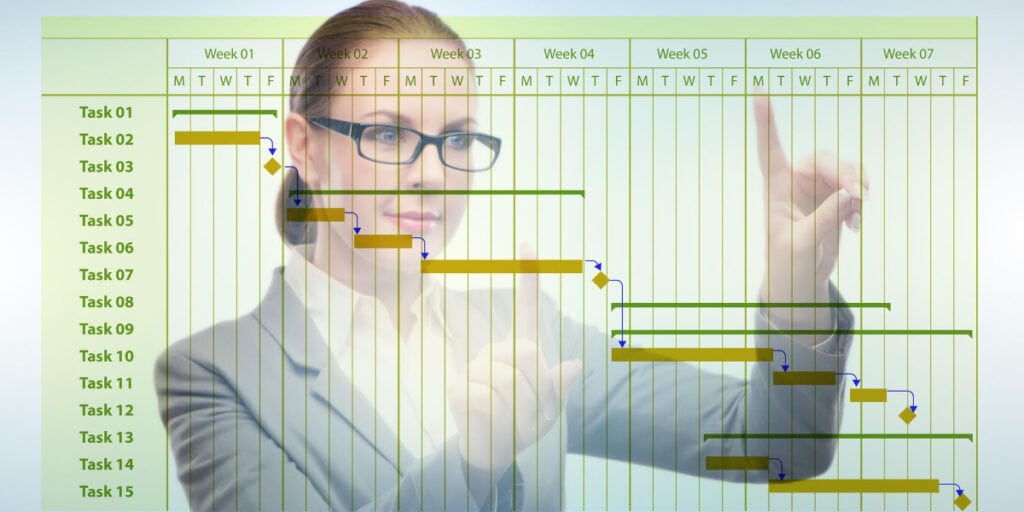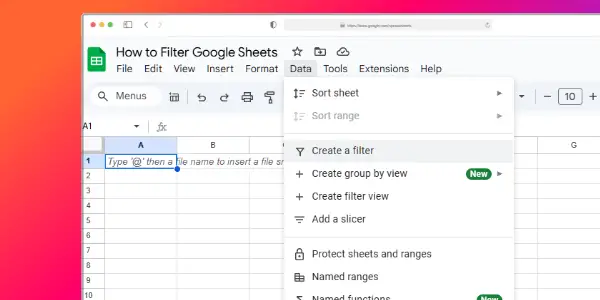It’s not uncommon to find those unfamiliar with the roles confused about the difference between project management and program management.
Simply put, project managers focus on individual projects while program managers focus on multiple projects that are all interconnected.
Programs are generally much larger in scope than projects, and they often span across multiple departments or organizations.
They can also be long-term initiatives that take years to complete. Because of their size and complexity, programs typically require more strategic thinking and overarching planning than individual projects.
If starting a new career you might be considering which role to apply for, let’s take a further look at what’s involved in both roles and what the clear career path is.
What is Project Management?
Project management is the process of leading the work of a team to achieve specific goals and deliverables. A project manager is the person responsible for doing this.
A project is generally focused on a specific outcome, for example the introduction of a new product, relocating staff to a new office, or adjusting company practices to take into account new legal requirements.

What makes a good project manager?
There are many qualities that make a good project manager, but some of the most important ones include being organized, detail-oriented, and able to effectively communicate with both team members and clients. In time, a good project manager will develop the following skills and experience:
- Excellent problem-solving skills
- Solid communication and interpersonal skills
- Effective team leader abilities
- Knowledge of business process improvement techniques
- Familiarity with software development tools such as Microsoft Project, or Trello etc.
The ability to effectively manage projects, prioritize tasks, and work with others means the role of project manager requires flexibility and adaptability.
How do you become a project manager?
There is no one-size-fits-all answer, as the best way to become a project manager depends on your existing skills and experience.
A traditional route that can help you get started would include:
- Get a qualification in project management
- Gain real world experience in the role
- Gain further certification, for example PRINCE2 or CAPM
The interesting thing about project management is that you don’t always need to gain a qualification to start gaining experience.
Small companies will often start to run and manage projects using internal staff, it’s something I’ve seen happen myself.
Staff learn on the job, as the company grows, and they look to enhance the skills they gain by undertaking formal training and certification, bringing new knowledge and methods into the business to better manage future projects.
What is program management?
Program management is the management of multiple projects that need to be coordinated in order to achieve an overarching goal. A program manager oversees all these individual projects and ensures that they are aligned with each other and moving towards the same goal.
What do I mean by a business program? It’s a strategic plan or roadmap outlining how a company plans to grow and improve its operations. It can be created by managers at all levels of an organization, but is typically overseen by the CEO.
A business program should include goals, objectives, and strategies for achieving these objectives, as well as timelines and milestones.
A key part of successful execution of a business program is project management, which focuses on managing projects (and their associated risks) in order to achieve stated outcomes.

What makes a good program manager?
A good program manager is someone who has a range of different project management skills and understands how to use them to improve business growth.
They are able to manage a variety of different projects, both large and small, and know how to effectively communicate with stakeholders.
Key skills required to be a program manager include:
- Ability to prioritize and manage competing demands on time and resources
- Strong analytical and problem-solving skills
- Proven track record of managing successful projects
- Excellent communication, coordination, & management skills
- Knowledge of project management software applications
- Experience in working with teams of professionals from different disciplines
- Advanced knowledge in project management tools and methodologies
They have a keen understanding of what makes a successful project, and are able to apply that knowledge to their own projects.
How do you become a program manager?
In many workplaces, the path to program management starts with project management as the first step is to become familiar with a variety of project management methodologies.
Once you have a strong understanding of how different types of projects are managed, it will be easier to see how program management can be used to better manage a range of different projects.
Additionally, you will need to have experience working in the business sector and understand what areas are crucial for growth.
Finally, you will need to possess excellent communication skills so that you can effectively liaise with all parties involved in a project.
Gaining this range of skills and experience will allow you to apply for the position (either in your company or elsewhere) or to request senior managers consider creating it as a new position that you can apply for.
Key Differences Between Project and Program Management:
Project management and program management are both critical for the success of an organization. They are similar in many ways, but the key difference between program management and project management is that program managers have a more holistic view of all the projects under their umbrella.
Program managers focus on ensuring that each individual project aligns with the company’s strategy, vision, and goals. In contrast, project managers typically focus narrowly on just one specific project at a time.
Programs are typically larger in scope than projects, involving multiple phases and multiple teams working together to achieve a common goal. Programs also tend to be more complex, with more stakeholders involved and more moving parts. As such, program managers need to have strong organizational skills and be able to juggle multiple priorities at once.
Another key difference is that programs often span a longer timeframe than projects. This means that program managers must be adept at long-term planning (via tools such as Gantt charts). They must also have experience managing risks associated with change over time.
Projects focus on delivering specific outputs within defined timelines. Many of the skills required are shared between the roles, which is why it’s common for project managers to go on to become program managers.

Should I be a Project or Program Manager?
When starting a career you might be tempted to go for program manager jobs as they often pay more. According to salary.com, the median salary for a program manager in the US is $141,829, and the median project manager salary is listed as $69,568.
The reason for the difference is experience. Project management is typically used when overseeing a single project, while program management is used when coordinating multiple projects, and to do that successfully takes practice.
Both project and program managers are responsible for ensuring that their projects are completed on time and within budget. However, program managers have additional responsibilities, such as ensuring that the different projects under their purview do not conflict with each other and fit together to achieve the organization’s overall goals.
In general, then, those interested in pursuing careers in program management but who don’t have any experience should first become a project manager. This will start you on the career path to becoming a program manager.
Final Thoughts
As mentioned above, while similar, there are some key differences between project management and program management.
The main difference is project managers work on one specific project at a time, while program managers oversee multiple projects simultaneously.
So those of you looking to start down this career path will do well to initially focus on becoming the best project manager you can be before taking on a program management role.
Sources
https://www.salary.com/research/salary/benchmark/program-manager-salary
https://www.salary.com/research/salary/benchmark/project-manager-i-salary





